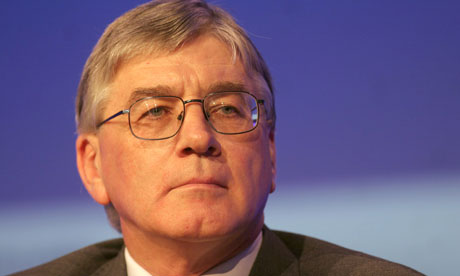
Dick Fedorcio, the Metropolitan police director of public affairs will be questioned by MPs at the select committee on Tuesday. Photograph: Richard Gardner / Rex Features
The search for the truth about the ties that bind Scotland Yard to News International is now likely to focus on the role of one man: Dick Fedorcio, director of public affairs for the Metropolitan police.
Guardian inquiries suggest that his 14 years at the head of the Yard's media operation made him a powerful figure, able to intervene in policy decisions; and that he has a history of particular closeness with the News of the World.
There is no evidence Fedorcio has done anything wrong, but there are troubling questions on which MPs want his help:
• Was Scotland Yard's failure to get to the truth in the original investigation in 2006 simply a case of incompetence (which is, in effect, their defence), or did the Yard deliberately cut short that inquiry as a favour to powerful friends at News International? MPs will want to know whether Fedorcio formally or informally had any influence over the decision.
• Was Scotland Yard's rapid decision to refuse to reopen the case in July 2009 influenced in any way by its close links with the News of the World? In relation to that controversial decision, was there any form of contact between Fedorcio and anyone at News International?
• Did Fedorcio play any role at all in the subsequent police statements to parliament, press and public which, we now know, included falsehoods, half-truths and evasions?
Fedorcio, 58, is a conservative figure, with a rugby player's chest and a businessman's suit, who was given an OBE in 2006. He rose through the ranks of local government PR (at the Greater London council, West Sussex, and Kent) and took over as head of public affairs at the Yard in September 1997, shortly before the arrival as deputy commissioner of John Stevens, who became a close ally. When Stevens became commissioner in 2000, the two men set out to find allies in Fleet Street, particularly among the conservative tabloids and the Daily Mail.
Fedorcio was far less close to Stevens's successor, Ian Blair. Indeed, several Yard sources claim that Fedorcio disliked the new commissioner. But his job gave him power: specifically, a seat on the elite senior management team which oversees major operational decisions and where Fedorcio's voice is said to be highly influential.
The fact of his link to Fleet Street reinforced that power. Like the PR heads of other organisations, he is said to have freely intervened on policy issues, changing strategy in search of better press coverage. One source recalls him sitting in with the July Review Group dealing with the aftermath of the shooting of Jean Charles de Menezes, and effectively chairing a meeting, even though he had no operational standing.
Those who have worked closely with Fedorcio all agree he is particularly close to Rebekah Brooks, who was editor of the News of the World and then of the Sun; and to Lucy Panton, the News of the World's crime correspondent.
They say Fedorcio sometimes has caused friction with his press officers by providing the News of the World with information in preference to other newspapers.
http://danielmorganmurderedbythemet.blogspot.com/2011/08/danielmorgan-stench-of-corruption.html
Fedorcio was present at a meeting when DCS Cook and his commander, Andre Baker, confronted Brooks with details of the surveillance, which could have been regarded as an attempt to pervert the course of justice.
http://danielmorganmurderedbythemet.blogspot.com/2011/08/danielmorgan-hackgate-murder-detective.html
The surveillance included following DCS Cook and his children; "blagging" personal data from confidential police databases; and attempting to access his voicemail and that of his wife.
Cook subsequently suspected that "Trojan horse" emails may have been sent to his computer, though no confirmation was ever found.
Fedorcio's personal links with the News of the World are part of a wider picture of close alliance. When John Stevens stepped down as commissioner in 2005 he was given a job as a columnist at the News of the World (a post that was secured, according to Yard sources, by Fedorcio).
When Ian Blair took over as commissioner his son was allowed to go on work experience at News International.
When Andy Hayman, the assistant commissioner in charge of the original phone-hacking inquiry, left under a cloud, he was given a job as a columnist on the Times, who also bought the serial rights to his memoirs.
Fedorcio is believed to have approved the highly controversial decision in September 2009 to hire the News of the World's former deputy editor, Neil Wallis, as a part-time media consultant at the same time as the paper was being publicly accused of crimes committed when Wallis worked there.
It is still not clear whether Wallis had any influence over the Yard's handling of the affair.
http://www.guardian.co.uk/media/2011/jul/19/phone-hacking-spotlight-dick-fedorcio
